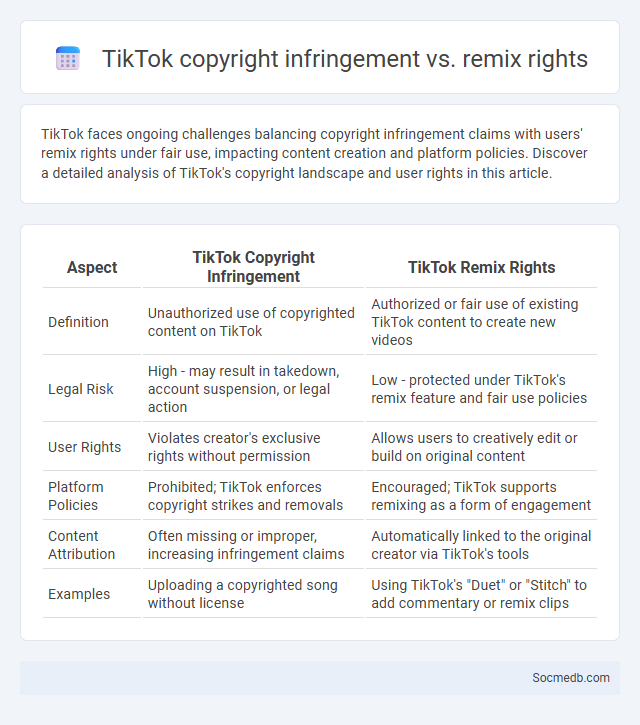
Photo illustration: TikTok copyright infringement vs remix rights
TikTok faces ongoing challenges balancing copyright infringement claims with users' remix rights under fair use, impacting content creation and platform policies. Discover a detailed analysis of TikTok's copyright landscape and user rights in this article.
Table of Comparison
| Aspect | TikTok Copyright Infringement | TikTok Remix Rights |
|---|---|---|
| Definition | Unauthorized use of copyrighted content on TikTok | Authorized or fair use of existing TikTok content to create new videos |
| Legal Risk | High - may result in takedown, account suspension, or legal action | Low - protected under TikTok's remix feature and fair use policies |
| User Rights | Violates creator's exclusive rights without permission | Allows users to creatively edit or build on original content |
| Platform Policies | Prohibited; TikTok enforces copyright strikes and removals | Encouraged; TikTok supports remixing as a form of engagement |
| Content Attribution | Often missing or improper, increasing infringement claims | Automatically linked to the original creator via TikTok's tools |
| Examples | Uploading a copyrighted song without license | Using TikTok's "Duet" or "Stitch" to add commentary or remix clips |
Understanding Copyright Law in the Digital Age
Understanding copyright law in the digital age is essential for navigating social media platforms while protecting your content and respecting creators' rights. Copyright law governs the use, reproduction, and distribution of digital media, including images, videos, and music that are commonly shared on social networks. Staying informed about fair use, licensing agreements, and the potential legal consequences of copyright infringement helps you maintain ethical and lawful online activity.
What Constitutes Copyright Infringement on TikTok?
Copyright infringement on TikTok occurs when Your content contains copyrighted materials such as music, videos, images, or other creative works used without permission from the rights holder. Uploading or sharing content that replicates or heavily borrows from someone else's original work without authorization violates TikTok's copyright policies and can lead to account suspension or legal consequences. Understanding TikTok's copyright guidelines ensures You respect intellectual property while creating engaging videos.
Defining Remix Rights: Creative Freedom or Legal Gray Area?
Remix rights on social media platforms refer to the permissions granted to users to modify, combine, or adapt existing content, fostering creative freedom while navigating complex copyright laws. These rights often exist in a legal gray area where content creators seek to balance originality and intellectual property protections, leading to ongoing debates about fair use and licensing agreements. Understanding platform-specific policies and copyright laws is crucial for users to legally share and remix content without infringing on original creators' rights.
TikTok’s Role in Shaping Copyright Practices
TikTok's rapid growth has significantly influenced global copyright practices by accelerating the need for clearer content licensing agreements and enforcement mechanisms. The platform's vast user-generated content ecosystem pushes creators and rights holders to adapt to short-form video formats and innovative copyright policies. Protecting Your original work while leveraging TikTok's reach requires understanding these evolving legal frameworks and platform-specific guidelines.
Common Copyright Infringement Scenarios on TikTok
TikTok faces common copyright infringement scenarios such as unauthorized use of copyrighted music, unlicensed clips from movies or TV shows, and repurposed user-generated content without proper attribution. These violations often trigger content takedown notices, impacting creators' visibility and account standing. Understanding TikTok's copyright policies and using licensed content libraries can mitigate infringement risks effectively.
The Legality of Remixing Content on TikTok
Remixing content on TikTok involves using or altering existing videos, which raises important legal considerations around copyright infringement and fair use. Your use of copyrighted material without permission can lead to takedown notices or legal claims, especially if the remix is monetized or widely distributed. Understanding TikTok's community guidelines and copyright policies helps protect your content while respecting creators' rights.
Fair Use Doctrine: How Does It Apply to TikTok?
The Fair Use Doctrine plays a crucial role in determining the legality of content shared on TikTok by allowing limited use of copyrighted material without permission for purposes such as commentary, criticism, or parody. TikTok creators must balance creativity with compliance by ensuring their videos qualify under fair use factors, including the purpose, nature, amount used, and market effect of the content. Courts often evaluate TikTok content on a case-by-case basis, emphasizing transformative use and minimal impact on the original work's value to uphold fair use claims.
Platform Tools & Policies for Copyright Protection
Social media platforms use advanced content recognition tools like automated filters and watermark detection to enforce copyright protection and prevent unauthorized use of intellectual property. Platform policies require users to respect copyright laws by submitting takedown requests and verifying content ownership, ensuring creators maintain control over their work. You can protect your original content by understanding these tools and complying with platform-specific guidelines, which help safeguard your creative rights effectively.
Real-World Cases: Copyright Disputes on TikTok
Real-world cases reveal numerous copyright disputes on TikTok, highlighting challenges creators face over unauthorized use of music and videos. You must understand copyright laws and TikTok's content policies to protect your original content from infringement claims. Platforms actively enforce takedown rules, but proactive rights management remains essential for creators to avoid legal complications.
Future Trends: Balancing Remix Culture and Copyright Enforcement
Social media platforms are evolving to balance remix culture, which thrives on creative reinterpretations, with stricter copyright enforcement to protect original content. Your ability to share and innovate will depend on emerging tools that use AI to identify copyrighted material while supporting fair use practices. This dynamic shift aims to foster creativity without compromising legal rights, shaping the future of digital content sharing.
 socmedb.com
socmedb.com